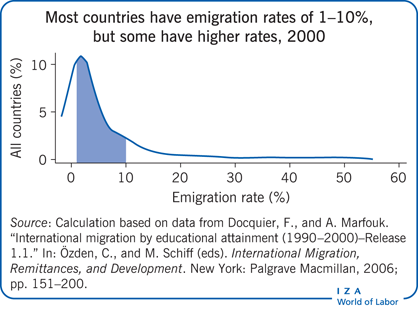Elevator pitch
How migration affects labor markets in receiving countries is well understood, but less is known about how migration affects labor markets in sending countries, particularly the wages of workers who do not emigrate. Most studies find that emigration increases wages in the sending country but only for non-emigrants with substitutable skills similar to those of emigrants; non-emigrants with different (complementary) skills lose. These wage reactions are short-term effects, however. If a country loses many highly educated workers, the economy can become less productive altogether, leading to lower wages for everyone in the long term.

Key findings
Pros
The short-term effects on wages are larger, and positive, in sending than in receiving countries.
Emigration can boost the wages of non-emigrants because the option to emigrate gives them greater bargaining power.
Emigration leads to labor shortages in the sending country, so the greatest wage increases are among non-emigrants with skills similar to those of emigrants.
The wage response to migration is larger in sending countries than in most receiving countries, in part because sending countries are on average smaller than receiving countries.
Cons
The positive average wage effects in sending countries are short-term effects.
Once capital adjusts, emigration affects mainly the wage distribution, creating winners and losers.
Low-skilled non-emigrants experience wage decreases, because their skills are complementary to those of the high-skilled emigrants.
In the long term, a country that loses many educated workers can become less productive, lowering wages for everyone.
If some regions have more emigrants than others, non-emigrants may move internally to fill the gaps left by emigrants, dampening any wage effect.